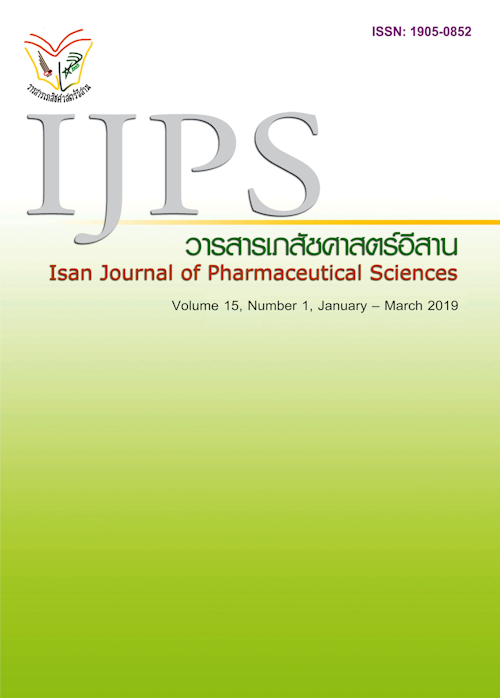Evaluation of the Appropriate Use of Erythropoiesis Stimulating Agents for Anaemia in Chronic Kidney Disease Patients: A Retrospective Study
Main Article Content
Abstract
Background: Anaemia is highly prevalent in end-stage renal disease (ESRD) patients. With regards to medication for this condition, erythropoiesis-stimulating agents (ESAs) have recently become known as the standard therapeutic agent for anaemia; furthermore, ESAs are one of the costly medications that are used in specific patients by specialists. The objectives of this study were 1) to evaluate the ESAs usage pattern in chronic kidney disease (CKD) treatment including the types of ESA (Epoetin alpha and Epoetin beta), 2) assess the dosage regimen and dosage adjustment according to the recommendations in Stage 4 and Stage 5 CKD patients, as well as the efficacy and Pure Red Cell Aplasia (PRCA) adverse drug event, and 3) review the total cost of the ESA treatment and cost of inappropriate dosage adjustment. Methods: The report is a descriptive analysis, a retrospective cohort study. Patients’ data were collected from medical records or by patients’ chart reviews of Rajavithi Hospital, Bangkok, Thailand between January 2013 and April 2016. Results: A total of 390 chronic renal anaemia patients with ESAs usage were screened in the Hospital. Of this total number, 201 patients were included in the study and 189 patients were excluded due to incomplete data, had received a kidney transplant, death, or the patient had not been receiving ESAs since January 2013. The inclusion criteria were as follows: aged 18 years or older, 39 patients (19.4%) were diagnosed as Stage 4 and 162 patients (80.6%) had Stage 5 that included pre-dialysis or HD/CAPD cases. One hundred and forty-two patients (70.65%) received Epoetin alpha and 59 patients (29.35%) received Epoetin beta, respectively. In the comparison of the Epoetin alpha usage and Epoetin beta usage in order to achieve the target of a Haemoglobin concentration(Hb) between 10.0 and 12.0 g/dL, the results showed that Epoetin beta usage could significantly achieve a higher target of the Hb concentration than Epoetin alpha usage (P<0.05). In addition, the Hb concentration of the generic brand of the Epoetin alpha was more stable than the original brand of Epoetin alpha non-significantly (P->0.05). Therefore, this study showed that the total cost of ESAs treatment was about 19,077,533.97 Thai Baht (THB) and the cost of inappropriate ESAs treatment was 101,258.38 Thai Baht (THB). Furthermore, there were no adverse drug event of pure red cell aplasia (PRCA) found. Conclusion: Epoetin beta had a higher performance in terms of achieving the target of the Hb concentration in chronic renal anaemia patients. It was also found that both the original or generic name of Epoetin alpha could achieve the target of the Hb concentration for anaemia treatment. Thus, appropriate ESAs treatment could prevent value loss to all CKD patients; moreover, none of the subjects developed PRCA upon administration of the study medication.
Article Details
In the case that some parts are used by others The author must Confirm that obtaining permission to use some of the original authors. And must attach evidence That the permission has been included
References
Domrongkitchaiporn S, Sritara P, Kitiyakara C,Stitchantrakul W, Krittaphol V, Lolekha P, et al. Risk factors for development of decreased kidney function in a southeast Asian population: a 12-year cohort study. J Am Soc Nephrol2005 Mar; 16(3):791-9.
Chittinandana A, Chailimpamontree W, Chaloeiphap P. Prevalence of chronic kidney disease in Thai adult population. J Med Assoc Thai2006 Aug; 89 Suppl: S112-20.
Ong-Ajyooth L, Vareesangthip K, KhonputsaP, Aekplakorn W. Prevalence of chronic kidney diseasein Thai adults: a national health survey. BMCNephrol2009; 10:35.
Ingsathit A, Thakkinstian A, Chaiprasert A, Sangthawan P, Gojaseni P, Kiattisunthorn K, et al. Prevalence and risk factors of chronic kidney disease in the Thai adult population: Thai SEEK study. Nephrol Dial Transplant May; 25(5):1567-75.
National list of essential medicines [online] 2012 [cited 2015 May 17]. Available form: https://drug.fda.moph.go.th:81/nlem.in.th/principles/medicine/measurement#cite_note-1
Chongtrakul P. Rational drug therapy. Thai National Formulary [online] 2008 [cited 2015 May 17]. Available from: https://www.fda.moph.go.th/sites/drug/.../New/RDU%20curriculum%202017.pdf
KDIGO Clinical Practice Guideline for Anemia in Chronic Kidney Disease. VOLUME 2 | ISSUE 4 | AUGUST (2) 2012 [Available at : https://www.kidney-international.org ]
National Kidney Foundation. K/DOQI Clinical Practice Guidelines and Clinical Practice Recommendations for Anemia in Chronic Kidney Disease. Am J Kidney Dis 2006; 47 (suppl 3):S1-S146
Lissy M, Ode M, Roth K. Comparison of the Pharmacokinetic and Pharmacodynamic Profiles of One US-Marketed and Two European-Marketed Epoetin Alfas: A Randomized Prospective Study. Drugs in R&D. 2011 Mar; 11(1):61–75.
Palmer SC, Navaneethan SD, Craig JC et al. Meta-analysis: erythropoiesis stimulating agents in patients with chronic kidney disease. Ann Intern Med 2010; 153: 23–
Fink J, Blahut S, Reddy M et al. Use of erythropoietin before the initiation of dialysis and its impact on mortality. Am J Kidney Dis 2001; 37: 348–355
European best practice guidelines for the management of anemia in patients with chronic renal failure. Nephrol Dial Transplant 1999; 14: 1–50


